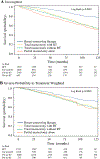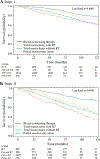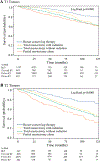Is Breast-Conserving Therapy Appropriate for Male Breast Cancer Patients? A National Cancer Database Analysis
- PMID: 30761438
- PMCID: PMC6545266
- DOI: 10.1245/s10434-019-07159-4
Is Breast-Conserving Therapy Appropriate for Male Breast Cancer Patients? A National Cancer Database Analysis
Abstract
Background: Current treatment guidelines for male breast cancer are predominantly guided by female-only clinical trials. With scarce research, it is unclear whether breast-conserving therapy (BCT) is equivalent to mastectomy in men. We sought to compare overall survival (OS) among male breast cancer patients who underwent BCT versus mastectomy.
Methods: We performed a retrospective analysis of 8445 stage I-II (T1-2 N0-1 M0) male breast cancer patients from the National Cancer Database (2004-2014). Patients were grouped according to surgical and radiation therapy (RT). BCT was defined as partial mastectomy followed by RT. Multivariable and inverse probability of treatment-weighted (IPTW) Cox proportional hazards models were used to compare OS between treatment groups, controlling for demographic and clinicopathologic characteristics.
Results: Most patients underwent total mastectomy (61.2%), whereas 18.2% underwent BCT, 12.4% underwent total mastectomy with RT, and 8.2% underwent partial mastectomy alone. In multivariable and IPTW models, partial mastectomy alone, total mastectomy alone, and total mastectomy with RT were associated with worse OS compared with BCT (p < 0.001 all). Ten-year OS was 73.8% for BCT and 56.3, 58.0 and 56.3% for other treatment approaches. Older age, higher T/N stage, histological grade, and triple-negative receptor status were associated with poorer OS (p < 0.05). Subgroup analysis by stage demonstrated similar results.
Conclusions: In this national sample of male breast cancer patients, BCT was associated with greater survival. The underlying mechanisms of this association warrant further study, because more routine adoption of BCT in male breast cancer appears to translate into clinically meaningful improvements in survival.
Conflict of interest statement
Figures



Similar articles
-
T1-2N0M0 Triple-Negative Breast Cancer Treated With Breast-Conserving Therapy Has Better Survival Compared to Mastectomy: A SEER Population-Based Retrospective Analysis.Clin Breast Cancer. 2019 Dec;19(6):e669-e682. doi: 10.1016/j.clbc.2019.05.011. Epub 2019 May 30. Clin Breast Cancer. 2019. PMID: 31375327
-
Survival following breast-conserving therapy is equal to that following mastectomy in young women with early-stage invasive lobular carcinoma.Eur J Surg Oncol. 2018 Nov;44(11):1703-1707. doi: 10.1016/j.ejso.2018.06.026. Epub 2018 Jul 7. Eur J Surg Oncol. 2018. PMID: 30029824
-
Breast conserving therapy is associated with improved overall survival compared to mastectomy in early-stage, lymph node-negative breast cancer.Radiother Oncol. 2020 Jan;142:186-194. doi: 10.1016/j.radonc.2019.09.018. Epub 2019 Oct 12. Radiother Oncol. 2020. PMID: 31615634
-
Breast-conserving therapy leads to better survival outcomes compared to mastectomy in patients with early breast cancer: evidences from the recent literature.Minerva Surg. 2023 Apr;78(2):183-193. doi: 10.23736/S2724-5691.22.09820-3. Epub 2023 Jan 18. Minerva Surg. 2023. PMID: 36651505 Review.
-
The reciprocal influences of prognosis between two types of surgical interventions and early breast cancer patients with diverse luminal subtypes: A meta-analysis.Medicine (Baltimore). 2019 Mar;98(11):e14912. doi: 10.1097/MD.0000000000014912. Medicine (Baltimore). 2019. PMID: 30882711 Free PMC article. Review.
Cited by
-
Surgery for Men with Breast Cancer: Do the Same Data Still Apply?Ann Surg Oncol. 2020 Nov;27(12):4720-4729. doi: 10.1245/s10434-020-08901-z. Epub 2020 Jul 23. Ann Surg Oncol. 2020. PMID: 32705510 Free PMC article.
-
Implementation of Choosing Wisely® Recommendations for Lymph Node Surgery in Male Breast Cancer.Ann Surg Oncol. 2024 Oct;31(11):7641-7653. doi: 10.1245/s10434-024-15811-x. Epub 2024 Jul 20. Ann Surg Oncol. 2024. PMID: 39031258 Free PMC article.
-
Living with Male Breast Cancer: A Qualitative Study of Men's Experiences and Care Needs.Breast Care (Basel). 2020 Feb;15(1):6-12. doi: 10.1159/000501542. Epub 2019 Jul 15. Breast Care (Basel). 2020. PMID: 32231492 Free PMC article.
-
Male triple negative axillary accessory breast cancer-a case report.Transl Cancer Res. 2022 Aug;11(8):2926-2930. doi: 10.21037/tcr-22-33. Transl Cancer Res. 2022. PMID: 36093543 Free PMC article.
-
Male breast cancer: Report of two cases with bloody nipple discharge.Radiol Case Rep. 2023 Jul 17;18(9):3323-3330. doi: 10.1016/j.radcr.2023.07.001. eCollection 2023 Sep. Radiol Case Rep. 2023. PMID: 37520394 Free PMC article.
References
-
- Siegel RL, Miller KD, Jemal A. Cancer Statistics, 2017. CA Cancer J Clin January 2017;67(1):7–30. - PubMed
-
- Gradishar WJ, Anderson BO, Balassanian R, et al. National Comprehensive Cancer Network. NCCN Clinical Practice Guidelines in Oncology: Breast Cancer Version 22017. https://www.nccn.org/professionals/physiciangls/pdf/breast.pdf.
-
- Fisher B, Anderson S, Bryant J, et al. Twenty-year follow-up of a randomized trial comparing total mastectomy, lumpectomy, and lumpectomy plus irradiation for the treatment of invasive breast cancer. N Engl J Med October 17 2002;347(16):1233–1241. - PubMed
-
- Aggarwal A, Liu ML, Krasnow SH. Breast cancer in male veteran population: an analysis from VA cancer registry. J Community Support Oncol August 2014;12(8):293–297. - PubMed
-
- O’Malley CD, Prehn AW, Shema SJ, Glaser SL. Racial/ethnic differences in survival rates in a population-based series of men with breast carcinoma. Cancer June 1 2002;94(11):2836–2843. - PubMed

